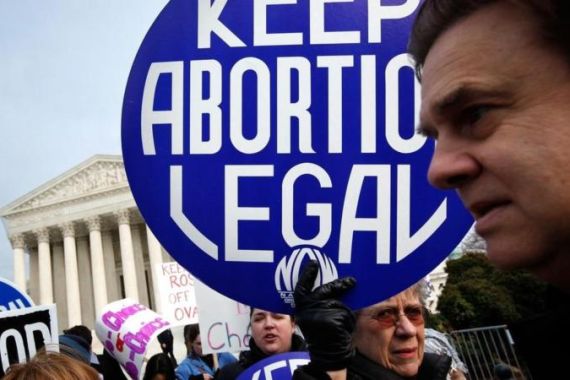Making women the actor in the abortion story
Forty years on after Roe v Wade, it is imperative we challenge the women-as-victim narrative.

In only the first two weeks of 2013, I’ve read hundreds of press releases from abortion-rights opponents about the cultural demise that has supposedly resulted from 40 years of legal abortion (the anniversary of the Roe v Wade decision is today, January 22). And no matter what they say, contained in all of these documents is a disempowerment of women in both the decision and the act. Statements such as “since Roe 45 million babies have been killed by abortion” are as frequent as “abortion is the cause of God’s wrath”.
This is because it’s much easier to see abortion as something we can disagree with when women are eliminated from the story. Note however, that opponents of abortion aren’t willing to say 45 million women have murdered their babies, or women themselves are causing God’s wrath. They may think it, but to blame women publically for abortion seems somehow callous. Leaving women out of the narrative, or including the new narrative that women are themselves also harmed by abortion, makes women sympathetic victims absolved of responsibility.
|
|
| Birthplace of US abortion law |
Additionally, pro-choice advocates haven’t been very good at countering this construction of women as victims, and in fact have fallen prey to their own women-as-victims storyline. In response to proposed restrictions on abortion, pro-choice advocates pull out stories of failed contraception, sexual violence, economic hardships, or wanted pregnancies gone terribly wrong. In a bid to gain public sympathy, the movement stands firm that “no one wants to have an abortion, rather abortion is a necessity imposed on women by circumstances outside her control”. While it is true that women needing abortions are often facing challenging life circumstances, the Pro-Choice Movement often focuses on the most egregious examples of “desperate women” who need abortions to the exclusion of supporting women’s active decision making. And everyone has contempt for women who use abortion “as a method of birth control”.
In this way, what both abortion rights supporters and opponents create a narrative that abortion is something that happens to women. On one side, women in the anti-abortion story are victims of an abortion industry that preys on their vulnerability and makes a profit from their suffering. On the other, women in the pro-choice story are forced to have an abortion by desperate situations. In neither story are women the actors.
Why is it important to challenge the women-as-victim narrative? It’s not true and never has been. Since the dawn of time, women have decided if, when and how many children they will have. They make these decisions affirmatively, even under the hardest of circumstances. And, just as societies are strengthened when families are strong, so families are strengthened when women are empowered. These very real female actors also lead social movements to improve their life circumstances, they become the change they want to see in the world.
It is time to return to women the lead role in their abortion stories. Women make decisions to terminate pregnancies because it allows them to control the direction and course of their lives. They are neither victims of a nefarious industry nor passive users of a constitutionally-granted right. Women are responsible for abortions, the number that happen every year and the decisions that cause them. We will never be able to have a real conversation about abortion if we cannot see that women are the actors in the story. Until then we will dance around legal and philosophical issues and never see abortion for what it is, a way for women to be in charge of their lives.
Dr Tracy A Weitz is the Director of the Advancing New Standards in Reproductive Health (ANSIRH) programme at the Bixby Center For Reproductive Health at UC San Francisco. She was an appointee of former California Governor Arnold Schwarzenegger to the Women’s Health Council, an advisory body to the California Department of Health Services.
